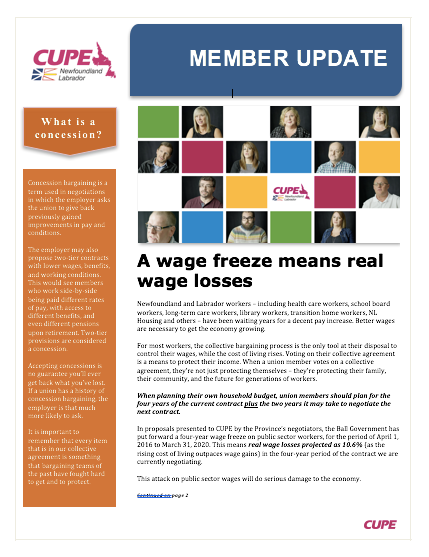 The following update is for CUPE NL members and locals affected by the current round of provincial bargaining. Please print and share this update with your local members.
The following update is for CUPE NL members and locals affected by the current round of provincial bargaining. Please print and share this update with your local members.
What is a concession?
Concession bargaining is a term used in negotiations in which the employer asks the union to give back previously gained improvements in pay and conditions.
The employer may also propose two-tier contracts with lower wages, benefits, and working conditions. This would see members who work side-by-side being paid different rates of pay, with access to different benefits, and even different pensions upon retirement. Two-tier provisions are considered a concession.
Accepting concessions is no guarantee you’ll ever get back what you’ve lost. If a union has a history of concession bargaining, the employer is that much more likely to ask.
It is important to remember that every item that is in our collective agreement is something that bargaining teams of the past have fought hard to get and to protect.
- Download a printable copy of the Member Update – November 29, 2017
A wage freeze means real wage losses
Newfoundland and Labrador workers – including health care workers, school board workers, long-term care workers, library workers, transition home workers, NL Housing and others – have been waiting years for a decent pay increase. Better wages are necessary to get the economy growing.
For most workers, the collective bargaining process is the only tool at their disposal to control their wages, while the cost of living rises. Voting on their collective agreement is a means to protect their income. When a union member votes on a collective agreement, they’re not just protecting themselves – they’re protecting their family, their community, and the future for generations of workers.
When planning their own household budget, union members should plan for the four years of the current contract plus the two years it may take to negotiate the next contract.
In proposals presented to CUPE by the Province’s negotiators, the Ball Government has put forward a four-year wage freeze on public sector workers, for the period of April 1, 2016 to March 31, 2020. This means real wage losses projected as 11.1% (compounded; as the rising cost of living outpaces wage gains) in the four-year period of the contract we are currently negotiating.
This attack on public sector wages will do serious damage to the economy. Suppressing public sector wages will eventually drive down private sector wages. If the Province is serious about growing the economy, they should not attack wages or retirement income.
Labour compensation and household spending are responsible for well over half of our country’s national income and spending and for more than 60 per cent of our economic growth since 2009.
Households have maintained consumer spending by increasing their debt to record levels and leveraging equity in their homes as house prices have escalated. This has been affordable with low interest rates, but won’t be sustainable as interest rates rise and real estate prices plateau or decline.
Increase in the cost of living* – Newfoundland and Labrador
| 2016 | 2017 | 2018 | 2019 | 2020 | 2021 |
| 2.7% | 2.6% | 2.9% | 2.4% | 2.4% | 2.6% |
If labour compensation and consumer spending don’t increase at a decent and sustainable pace, then our economy won’t grow at a decent pace either.
The chart below can be used to estimate how much you will lose if your wages remain the same during this four-year period, plus the two years it may take to negotiate the next collective agreement.
| Annual Wages |
Wage Losses |
|||
| 2016 | 2017 | 2018 | 2019 | |
| 20000 | 520 | 540 | 580 | 480 |
| 30000 | 780 | 810 | 870 | 720 |
| 40000 | 1040 | 1080 | 1160 | 960 |
| 50000 | 1300 | 1350 | 1450 | 1200 |
| 60000 | 1560 | 1620 | 1740 | 1440 |
| 70000 | 1820 | 1890 | 2030 | 1680 |
*Source: The 2017 Economic Review – Fall Forecast, Newfoundland and Labrador Department of Finance
CUPE sets plan to fight concessions and two-tier bargaining
The National Executive Board is reaffirming CUPE’s commitment to fighting concessions and two-tier contract provisions, and defending the free collective bargaining rights of its members. At a meeting in December last year, the NEB approved a revised policy on collective bargaining that sets out a plan to ensure CUPE locals and members are fully prepared to fight back against attacks during bargaining.
“Workers did not join CUPE in order to move backwards, to lose wages or benefits, or lower their working conditions. They joined our union so they could move forward, with a better work life, more secure employment, and safe working conditions,” said Mark Hancock, national president of CUPE.
“We have an obligation to our members to resist concessions, two-tier contract provisions, and precarious work. If a contract provision is not good enough for our current members, it is not good enough for the next generation of workers either.”
The revised policy outlines roles and responsibilities of all elected leaders and staff in fighting concessions, resisting two-tier contract proposals from employers, and defending the free collective bargaining rights of CUPE members.
Read the full NEB Policy on Collective Bargaining at https://cupe.ca/sites/cupe/files/gm/20170628/collective-bargaining-policy.pdf.
- Download a printable copy of the Member Update – November 29, 2017



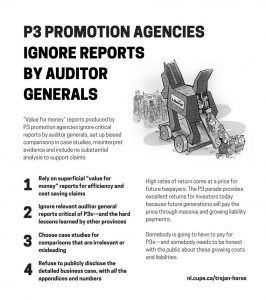 When public-private partnerships (P3) promoters use buzzwords like “innovation” and “stability” while talking about P3s, it means they’ve drunk the Kool-Aid. Privatization can take many forms, and its promoters often use different terms to hide what they’re doing.
When public-private partnerships (P3) promoters use buzzwords like “innovation” and “stability” while talking about P3s, it means they’ve drunk the Kool-Aid. Privatization can take many forms, and its promoters often use different terms to hide what they’re doing.
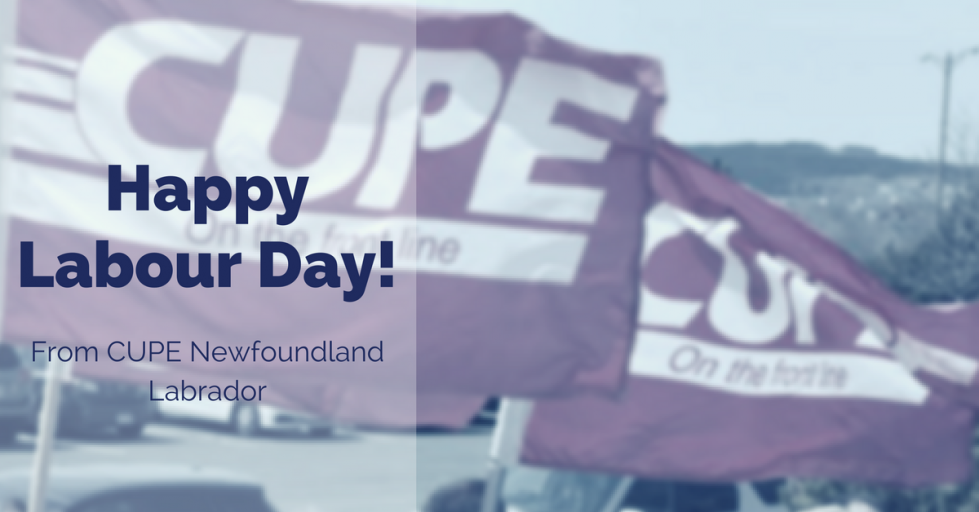

 Two new radio ad campaign by public service workers in Newfoundland and Labrador hit the airwaves this week, on radio stations across the province. CUPE’s public services workers launched the ads to voice their concerns about the Ball Government’s failure to protect good jobs, as well as the impact on our economy and our public services.
Two new radio ad campaign by public service workers in Newfoundland and Labrador hit the airwaves this week, on radio stations across the province. CUPE’s public services workers launched the ads to voice their concerns about the Ball Government’s failure to protect good jobs, as well as the impact on our economy and our public services. CUPE believes the Ball Government should recognize the public sector as a driver of economic growth. There are steps the Province can take in the collective bargaining process – and in the next budget – that put people first, protect the public services we need, create good jobs and a stronger economy.
CUPE believes the Ball Government should recognize the public sector as a driver of economic growth. There are steps the Province can take in the collective bargaining process – and in the next budget – that put people first, protect the public services we need, create good jobs and a stronger economy.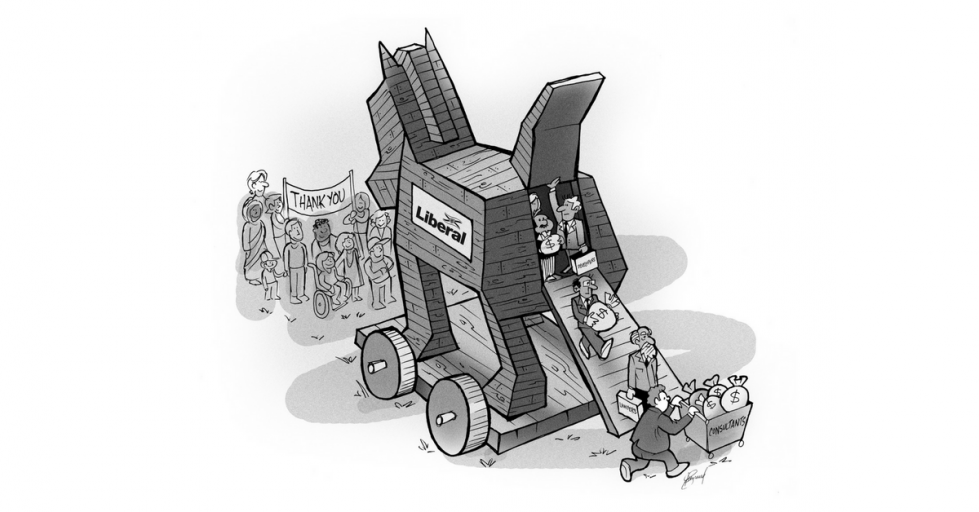
 What exactly are public-private partnerships? Instead of using its own borrowing power, a government looking to build public infrastructure uses private-sector money for the project. The private sector invests some (or all) of the required money in return for healthy financial returns and a measure of control.
What exactly are public-private partnerships? Instead of using its own borrowing power, a government looking to build public infrastructure uses private-sector money for the project. The private sector invests some (or all) of the required money in return for healthy financial returns and a measure of control.

 CUPE Newfoundland and Labrador would like to invite everyone to meet our 15-foot tall wooden Trojan Horse at the Royal St. John’s Regatta on August 2. Members will be on hand to talk to the hidden dangers of using public-private partnerships (P3s) to build health care facilities.
CUPE Newfoundland and Labrador would like to invite everyone to meet our 15-foot tall wooden Trojan Horse at the Royal St. John’s Regatta on August 2. Members will be on hand to talk to the hidden dangers of using public-private partnerships (P3s) to build health care facilities.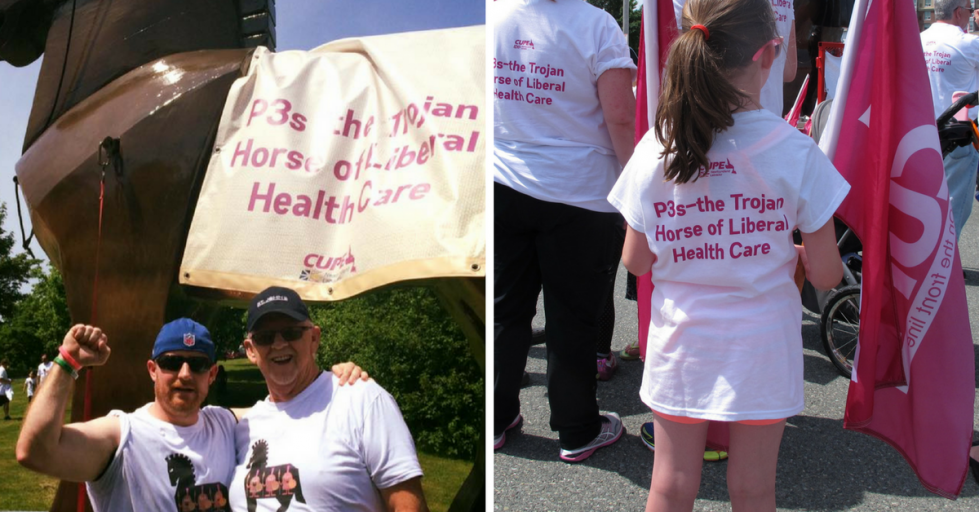
 Say NO to privatizing our health care!
Say NO to privatizing our health care! 
